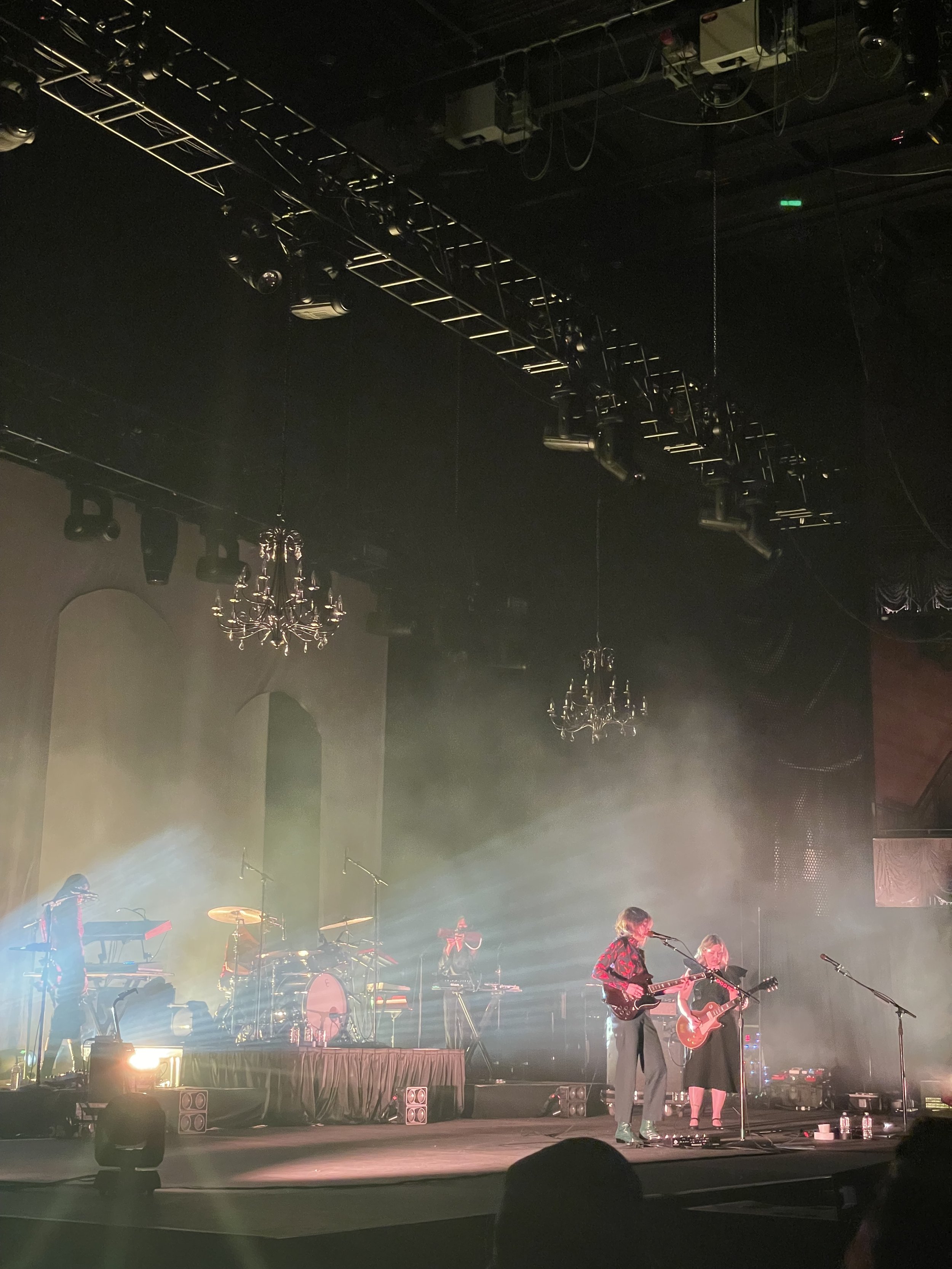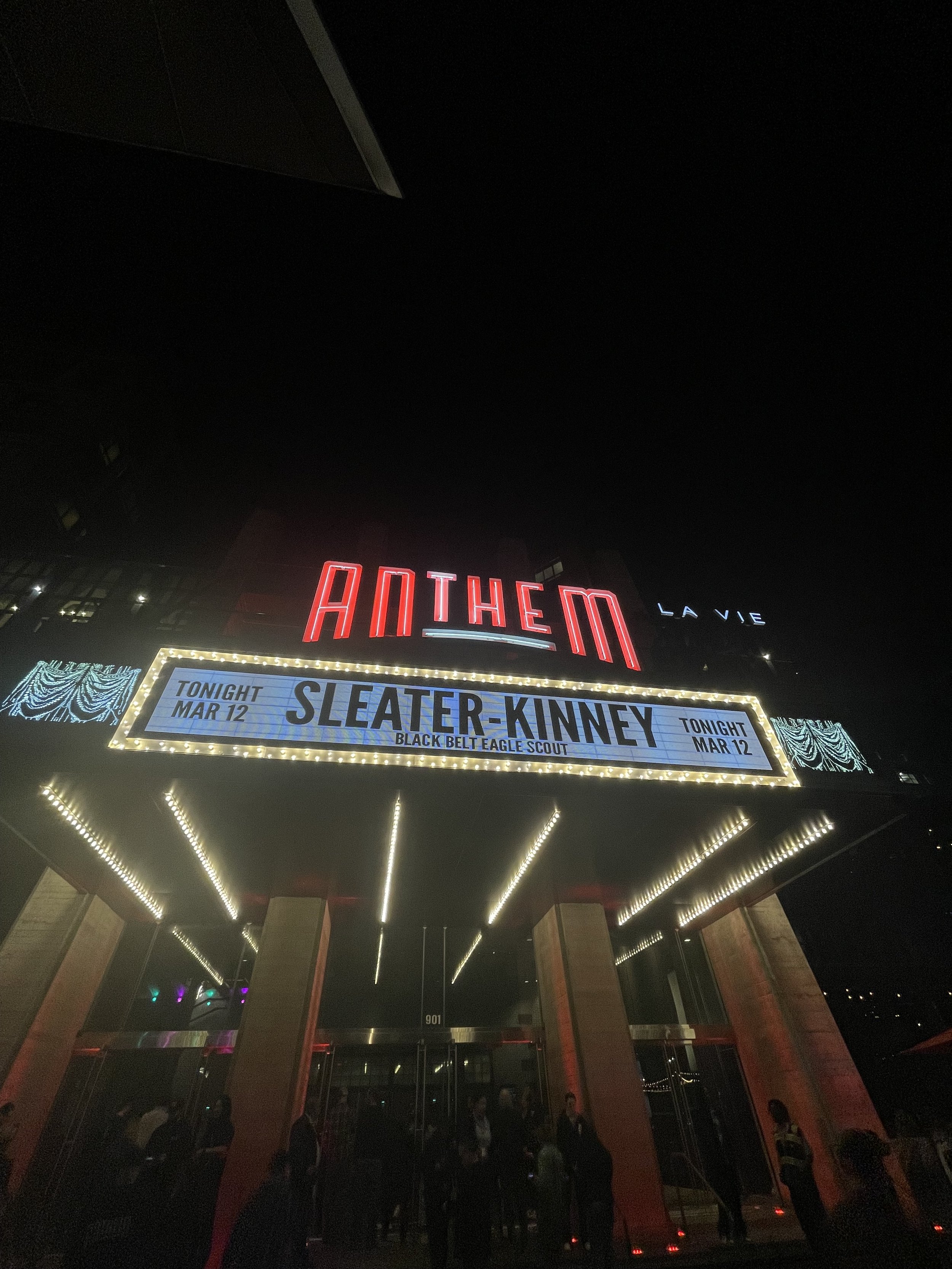Sleater-Kinney and Black Belt Eagle Scout rock out for a new generation of riot grrrls
By Serena Zets
Like many Gen Z feminists, I grew up idolizing the riot grrrl movement of the 90s. Listening to Bikini Kill, Le Tigre, Bratmobile, and L7 ushered me into the feminist movement like a loud rite of passage. While I loved each of these bands, my heroes were the unparalleled Carrie Brownstein, Corin Tucker, and Janet Weiss of Sleater-Kinney. Their albums, including my favorites, Dig Me Out and The Woods, soundtracked my angsty adolescence in Pittsburgh, a rare place that was both as gloomy and repressed as the Pacific Northwest. When the band went on hiatus from 2006 to 2014, I found other ways to engage in their work. When I began working as a music and theater critic, I turned to Carrie Brownstein’s 2015 memoir Hunger Makes Me a Modern Girl to show me the way. I devoured Brownstein’s artist interviews in The Believer Magazine - and Portlandia became my comfort show when I started liberal arts college. Everywhere I turned, Sleater-Kinney was already there. It was like they had been waiting for me to meet them where they had always been. I was the one late to the party.
I spent the better part of my teenage years wondering if the band would ever reunite. While listening to their discography was one specific joy, seeing them live would be entirely different. The band finally returned in 2014 and have released five more albums since then, their most recent being Little Rope which came out January 19th on Loma Vista. Long-time drummer Weiss left the group in 2019 but Brownstein and Tucker march onwards as a duo with a rotating backing band. Of the five albums since the band’s reunion a decade ago, Little Rope is my favorite. The album was born out of Carrie Brownstein navigating the immense grief of suddenly losing her mother and stepfather in late 2022. Tucker helped Brownstein through this time and the honest and raw artistry of Little Rope came out of it. Half of the album was written before the tragic deaths and the rest was written in the wake of them. When listening to Little Rope, it is hard to determine the timeline of songwriting because all of the songs are so distinctly Sleater-Kinney. It doesn’t matter when they were written, it is just important that they were.
The Little Rope world tour brought Sleater-Kinney back to D.C. on March 12th for an energetic show where the crowd was equally excited to hear the new tracks as they were to hear songs that came out twenty-five years ago. For some older fans, it was a reunion with the band they’ve loved and followed for so long since their grungy early days. For others like myself, it was a pilgrimage to see two women do exactly what they were meant to do in this lifetime: come together to create music that has informed the experiences and musical tastes of generations of people. The crowd was proudly intergenerational. Some of the sweetest sights in the crowd were parents and children of all ages clinging to each other as they screamed the words alongside Brownstein and Tucker.
Sleater-Kinney’s stage design hung two massive Gothic chandeliers over Brownstein and Tucker, turning the already cavernous venue into what felt like a church. The crowd was devout in its attention to what unfolded on stage: Brownstein and Tucker rocking out in peak form. Watching them perform made me consider how two people sustain decades of being so effortlessly and publicly cool. If it takes a toll on them, a spectator would have no way of knowing. It makes me wonder what their stage presence was like when they were starting out and playing crammed house shows across Washington state. Now, thirty years later they’re playing The Anthem, one of the biggest venues in Washington, D.C.
Brownstein made a nod to the older songs they played and said “We’ve been playing the requests we’re still capable of playing on this tour” before introducing “One More Hour” off of the band’s breakthrough album, Dig Me Out which came out over 25 years ago. The concert reached a height when the band played two of their biggest hits, the titular “Dig Me Out” and “Modern Girl” off of 2005’s The Woods. “Hunger makes me a modern girl,” a lyric from “Modern Girl” would go on to become Brownstein’s best-selling memoir title, copies of which were for sale at the merch stand. Those two songs speak to particularly important moments in Sleater-Kinney’s journey to where they are now. If Dig Me Out was an introduction and The Woods was an arrival, Little Rope is a reminder of who they are and why you love them.
New hits including the show-opening “Hell”, “Hunt You Down”, and “Say It Like You Mean It” got the crowd riled up and dancing together. I found myself in awe of Brownstein and Tucker’s synergy while playing songs that are potentially difficult to return to or to introduce to the world. They seemed to have a subtle unspoken language between the two of them throughout the performance, checking in on each other and continuing with the show. Little Rope’s subject matter might be painful for Brownstein but she seemed at ease playing the album’s songs and the crowd’s energetic response to them showed they’re a perfect fit within the already iconic and expansive Sleater-Kinney discography.
Black Belt Eagle Scout and Sleater-Kinney proved to be a powerful pairing for the next generation of riot grrrls making music in pursuit of a better world. Just like I came up on Sleater-Kinney and their contemporaries, young listeners now have the politically engaged and enraged generation of Black Belt Eagle Scout to listen to as well. The concert was a portal to another world, one where women and non-binary folks are calling all of the shots and creating beautiful music and community with this newfound power, rather than waging war or causing harm.
Amidst the transportive set, there were specific minutes that brought us all back to this earth we inhabit together. As an indigenous artist making art amidst an ongoing genocide, Katherine Paul, the artist behind Black Belt Eagle Scout, dedicated a song to recognizing genocide and colonization happening around you. Additionally, as a queer and indigenous artist, they dedicated their closing song to trans and non-binary indigenous youth, in the wake of Nex Benedict’s death in Oklahoma. Black Belt Eagle Scout reminded the crowd to listen to the words and demands of queer and indigenous people in all forms, not just through their music.
Bringing Black Belt Eagle Scout onto this tour to spread their music and their message is a powerful reminder of Sleater-Kinney’s origins as a radical riot grrrl band. Black Belt Eagle Scout and Sleater-Kinney remind their crowd to carry this ethos beyond the concert venue and into our daily lives and interactions. Sleater-Kinney and Black Belt Eagle Scout’s shared commitment to their craft and politics is one that generations of listeners can listen to and learn from. Their gig is one I’ll be thinking about for a long time as we continue to live in a period of political tumult, upheaval, and uncertainty. As I’ve experienced before, Sleater-Kinney is always waiting for me whenever I need them. I can’t wait to see where we find each other next.


